
Assignment and discussion prompts for 100-level anthropology courses. Scoring criteria are included.
- Subject:
- Anthropology
- Social Science
- Material Type:
- Activity/Lab
- Assessment
- Homework/Assignment
- Author:
- Mary Courtis
- Date Added:
- 08/21/2018

Assignment and discussion prompts for 100-level anthropology courses. Scoring criteria are included.

This class examines the ways humans experience the realm of sound and how perceptions and technologies of sound emerge from cultural, economic, and historical worlds. In addition to learning about how environmental, linguistic, and musical sounds are construed cross-culturally, students learn about the rise of telephony, architectural acoustics, and sound recording, as well as about the globalized travel of these technologies. Questions of ownership, property, authorship, and copyright in the age of digital file sharing are also addressed. A major concern will be with how the sound/noise boundary has been imagined, created, and modeled across diverse sociocultural and scientific contexts. Auditory examples — sound art, environmental recordings, music — will be provided and invited throughout the term.

This is a multi-format ethnographic field collection project, undertaken during the New Deal, that includes sound recordings, still photographs, drawings, and written documents from a variety of European ethnic and English- and Spanish-speaking communities in Northern California.

By conducting interviews, sharing and assessing data, and writing papers based on their authentic research, students reach their own conclusions on the meaning of the American Dream.

This course enhances cross-cultural understanding through the discussion of practical, ethical, and epistemological issues in conducting social science and applied research in foreign countries or unfamiliar communities. It includes a research practicum to help students develop interviewing, participant-observation, and other qualitative research skills, as well as critical discussion of case studies. The course is open to all interested students, but intended particularly for those planning to undertake exploratory research or applied work abroad. Students taking the graduate version complete additional assignments.

This course is an introductory exploration of documentary film theory and production, focusing on documentaries about science, engineering, and related fields. Students engage in digital video production as well as social and media analysis of science documentaries. Readings are drawn from social studies of science as well as from documentary film theory. The courses uses documentary video making as a tool to explore the worlds of science and engineering, as well as a tool for thinking analytically about media itself and the social worlds in which science is embedded. The course includes a hands-on lab component devoted to digital video production, in addition to classroom lectures and in-class film screenings.
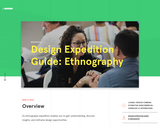
An ethnography expedition enables you to gain understanding, discover insights, and (re)frame design opportunities.
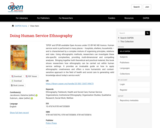
"EPDF and EPUB available Open Access under CC-BY-NC-ND licence. Human service work is performed in many places – hospitals, shelters, households – and is characterised by a complex mixture of organising principles, relations and rules. Using ethnographic methods, researchers can investigate these site-specific complexities, providing multi-dimensional and compelling analyses. Bringing together both theoretical and practical material, this book shows researchers how ethnography can be carried out within human service settings. It provides an invaluable guide on how to apply ethnographic creativeness and offers a more humanistic and context-sensitive approach in the field of health and social care to generating valid knowledge about today’s service work."

This course explores the complex interrelationships among humans and natural environments, focusing on non-western parts of the world in addition to Europe and the United States. It uses environmental conflict to draw attention to competing understandings and uses of “nature” as well as the local, national and transnational power relationships in which environmental interactions are embedded. In addition to utilizing a range of theoretical perspectives, this subject draws upon a series of ethnographic case studies of environmental conflicts in various parts of the world.
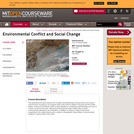
This course explores the complex interrelationships among humans and natural environments, focusing on non-western parts of the world in addition to Europe and the United States. It uses environmental conflict to draw attention to competing understandings and uses of “nature” as well as the local, national and transnational power relationships in which environmental interactions are embedded. In addition to utilizing a range of theoretical perspectives, this subject draws upon a series of ethnographic case studies of environmental conflicts in various parts of the world.
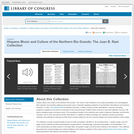
This is an online presentation of a multi-format ethnographic field collection documenting religious and secular music of Spanish-speaking residents of rural Northern New Mexico and Southern Colorado. The collection consists of approximately 8 hours of audio recordings (146 titles on 36 recording discs), 1 graphic image, and 218 pages of print material including administrative correspondence, recording logs, song text transcriptions, and publications.

This course introduces diverse meanings and uses of the concept of culture with historical and contemporary examples from scholarship and popular media around the globe. It includes first-hand observations, synthesized histories and ethnographies, quantitative representations, and visual and fictionalized accounts of human experiences. Students conduct empirical research on cultural differences through the systematic observation of human interaction, employ methods of interpretative analysis, and practice convincing others of the accuracy of their findings.
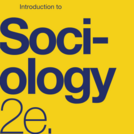
Introduction to Sociology 2e adheres to the scope and sequence of a typical, one-semester introductory sociology course. It offers comprehensive coverage of core concepts, foundational scholars, and emerging theories, which are supported by a wealth of engaging learning materials. The textbook presents detailed section reviews with rich questions, discussions that help students apply their knowledge, and features that draw learners into the discipline in meaningful ways. The second edition retains the book’s conceptual organization, aligning to most courses, and has been significantly updated to reflect the latest research and provide examples most relevant to today’s students. In order to help instructors transition to the revised version, the 2e changes are described within the preface.


Differentiate between four kinds of research methods: surveys, field research, experiments, and secondary data analysisUnderstand why different topics are better suited to different research approaches

Global exploration in the eighteenth and nineteenth centuries radically changed Western science, orienting philosophies of natural history to more focused fields like comparative anatomy, botany, and geology. In the United States, European scientific advances and home-grown ventures like the Wilkes Exploring Expedition to Antarctica and the Pacific inspired new endeavors in cartography, ethnography, zoology, and evolutionary theory, replacing rigid models of thought and classification with more fluid and active systems. They inspired literary authors as well. This class will examine some of the most remarkable of these authors—Herman Melville (Moby-Dick and “The Encantadas”), Henry David Thoreau (Walden), Sarah Orne Jewett (Country of the Pointed Firs), Edith Wharton (House of Mirth), Toni Morrison (A Mercy), among others—in terms of the subjects and methods they adopted, imaginatively and often critically, from the natural sciences.

This course introduces scholarly debates about the sociocultural practices through which individuals and societies create, sustain, recall, and erase memories. Emphasis is given to the history of knowledge, construction of memory, the role of authorities in shaping memory, and how societies decide on whose versions of memory are more “truthful” and “real.” Other topics include how memory works in the human brain, memory and trauma, amnesia, memory practices in the sciences, false memory, sites of memory, and the commodification of memory. Students taking the graduate version complete additional assignments.

This course is an introduction to selected musical traditions of West Africa. A variety of musical practices and their cultural contexts will be explored through listening, reading, and written assignments, with an emphasis on class discussion. The course includes in-class instruction in West African drumming, song and dance, as well as lecture-demonstrations by guest artists.
After an introductory unit, the course will be organized around four main geographical areas: Senegal, Mali, Ghana, and Nigeria. An in-depth study of music from these countries will be interspersed with brief overviews of Southern, Central, and East Africa.

Still photography, a practice and form of expression that has worked its way into every facet of social life and every culture in the world, is considered here from the perspectives of history and social science. We will discuss the uses and functions of pictures; how they are to be understood and interpreted; whether they have clear-cut content and meanings; how they shape and are shaped by politics, economics, and social life.

This course is designed to provide an introduction to a variety of empirical research methods used by political scientists. The primary aims of the course are to make you a more sophisticated consumer of diverse empirical research and to allow you to conduct advanced independent work in your junior and senior years. This is not a course in data analysis. Rather, it is a course on how to approach political science research.